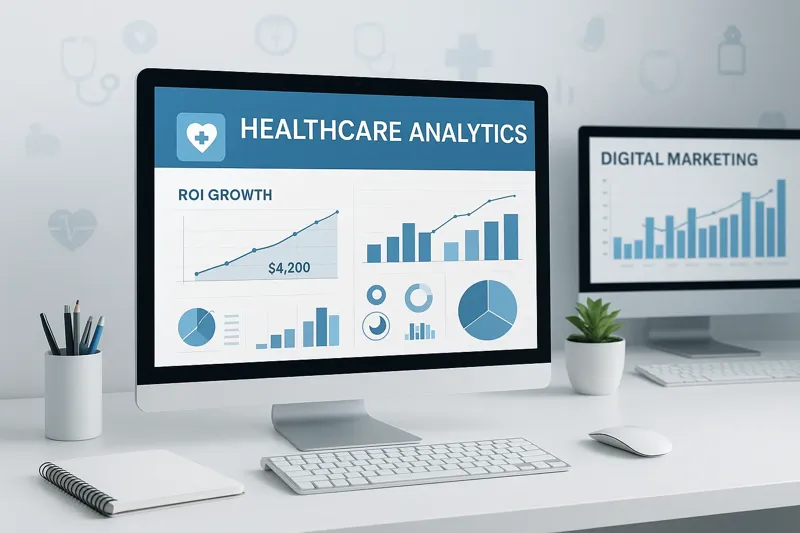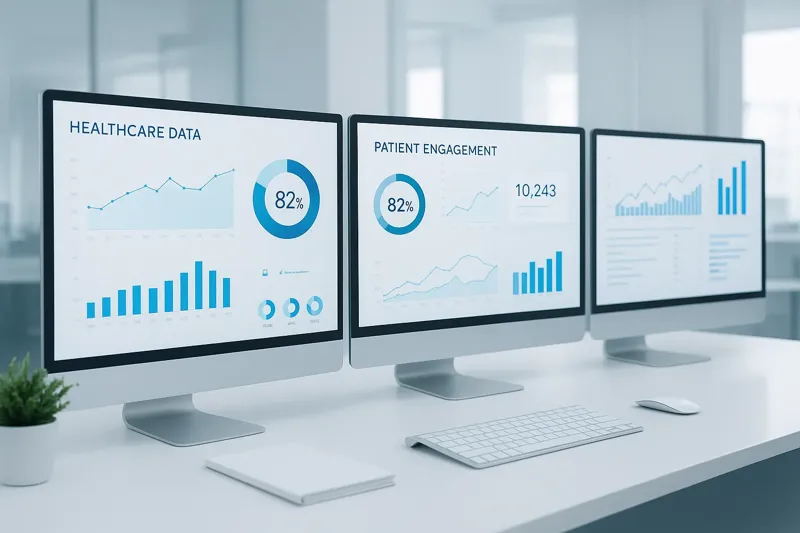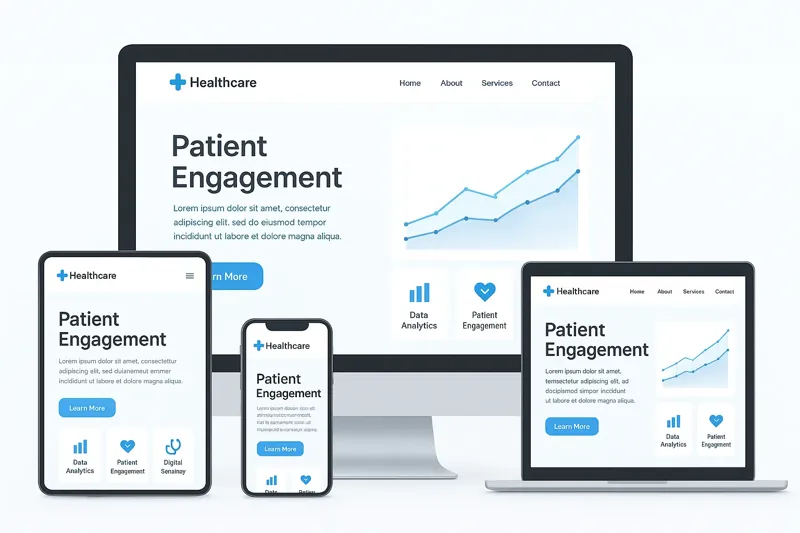Why Online Reputation Matters for Medical Practices
Impact of Online Reviews on Patient Decisions
Online reviews significantly influence patient choices, with nearly 84% of patients relying on them to evaluate healthcare providers before making appointments. Positive reviews serve as social proof, validating the quality of care and shaping first impressions that directly affect patient acquisition.
Importance of Trust and Credibility
A strong online reputation builds essential trust and credibility between medical practices and prospective patients. Transparent management of reviews, including responding professionally to both positive and negative feedback, demonstrates commitment to patient satisfaction and helps foster long-term loyalty.
Role of Online Reputation in Practice Growth
Healthcare practices with robust online reputations experience increased visibility and a competitive edge. Enhanced online presence drives organic patient growth by attracting referrals, improving search engine rankings, and opening opportunities for professional development, ultimately contributing to financial and reputational success.
The Influence of Patient Reviews on Healthcare Choices

What Percentage of Patients Rely on Online Reviews?
Patient reliance on online reviews is strikingly high in healthcare decision-making. Research shows that approximately 84% to 94% of patients consult online reviews before choosing healthcare providers. For example, 94% of patients acknowledge that reviews influence their decisions significantly. Additionally, about 77% of patients use online reviews as their first step to find a new doctor, underlining their vital role in initial evaluation. For more insights, see Reputation Management for Doctors and Medical Reputation Management Strategies.
How Do Star Ratings Affect Patient Trust and Decision-Making?
Star ratings are critical signals of quality and trustworthiness to potential patients. Most patients prefer doctors who have ratings of 4 stars or higher. Specifically, 84% of patients would avoid a physician rated four stars or less, highlighting the strong preference for highly rated healthcare providers. Ratings in the range of 4.5 to 4.9 stars are seen as optimal, delivering the best return on investment for practices by attracting more patient inquiries and appointments. Moreover, star ratings influence not only patient trust but also search engine rankings, which further enhance a practice’s visibility and reputation. For detailed strategies, refer to Improve healthcare reputation management and Online Reputation Management for Doctors.
What Is the Impact of Review Volume and Recency?
The volume and freshness of patient reviews play a significant role in shaping perceptions and search rankings. Patients often examine more than 19 reviews before making a healthcare choice, indicating that a substantial number of reviews builds credibility and confidence. The recency of reviews is also crucial, as newer reviews are perceived as more reliable and reflective of current practice quality. Research highlights that it takes about 1 to 6 reviews for potential patients to form an opinion, underscoring the necessity of consistently generating new patient feedback. Practices employing automated systems for timely review requests see higher engagement and improved overall reputation. Learn more about Review and Reputation Management for Medical Office and Tips for Doctors' Reputation Management.
Maintaining a steady flow of recent positive reviews combined with high star ratings is essential for enhancing patient trust, increasing online visibility, and supporting patient acquisition strategies in healthcare. For comprehensive advice, explore Healthcare reputation management strategies and Mastering Healthcare Reputation Management.
Effective Strategies for Collecting and Managing Patient Feedback

Encouraging Authentic Patient Reviews
Authentic patient reviews are fundamental to establishing trust and credibility in healthcare. Practices should encourage patients to share genuine feedback reflecting their experiences without offering incentives, as fake or manipulated reviews can damage reputation and violate platform policies. Encouraging transparency and honesty helps build a trustworthy online presence that prospective patients rely on. For strategies on encouraging positive patient reviews, see Encouraging Positive Patient Reviews.
Timing and Methods for Review Requests
The timing of review requests significantly influences response rates. Sending automated review invitations via email or SMS shortly after patient appointments enhances review volume and recency, both critical factors in improving search rankings and patient trust. Utilizing multiple channels—such as text messages, emails, QR codes in-office, or online portals—makes it convenient for patients to leave feedback, thereby increasing participation. Immediate and easy-to-complete review requests harness the patient's fresh experience, boosting the likelihood of positive and detailed reviews. Learn more about automated review invitations and optimizing patient outreach in Review Management Software for Healthcare and How to get more online reviews and why it matters for your practice.
Use of Patient Satisfaction Surveys and Internal Feedback Loops
Implementing patient satisfaction surveys through digital platforms can capture detailed insights into patient experiences, identifying strengths and areas for improvement. Automated internal feedback loops, such as follow-up digital surveys post-visit, help practices monitor systemic issues like scheduling and billing, often referenced in negative reviews. These mechanisms allow proactive resolution before patients post unfavorable online feedback. Surveys contribute to data-driven improvements and enhance patient satisfaction, translating into better online reputation. For insights on patient satisfaction surveys and feedback systems, see Patient Satisfaction Survey Benefits, Using Digital Surveys for Patient Feedback, and Improving Patient Experience Through Feedback.
Avoiding Fake or Incentivized Reviews
Maintaining ethical standards in review solicitation is vital. Healthcare practices must avoid offering rewards or incentives in exchange for reviews, as this compromises authenticity and can lead to legal and reputational risks. Genuine reviews carried out transparently carry more weight with patients and review platforms alike. Compliance with industry regulations and review site policies ensures sustainable reputation management and patient trust. For guidance on managing reviews ethically and professionally, refer to Managing Negative Online Reviews, Ethical Positive Review Gathering, and HIPAA Compliance in Reputation Management.
The Role of Reputation Management Software in Healthcare

Features of leading reputation management platforms
Leading solutions like DocResponse, Press Ganey, and Solutionreach offer comprehensive tools tailored to healthcare providers. They facilitate review collection, monitor patient feedback across multiple channels, and provide analytic insights essential for strategic reputation management (Reputation Management for Healthcare Providers, Healthcare reputation management platform, Reputation Management for Medical Practices).
Automated review invitations and monitoring
These platforms streamline review solicitation through automated invitations sent via email or SMS shortly after appointments, optimizing patient response rates. Continuous review monitoring ensures timely awareness of new patient feedback to address concerns promptly (Review and Reputation Management for Medical Office, Online Reputation Management for Healthcare Practices, Managing Negative Online Reviews).
Sentiment analysis and AI-driven response suggestions
Advanced tools employ sentiment analysis powered by natural language processing (NLP) to interpret patient comments, revealing emotions and pain points. AI-driven response suggestions assist providers in crafting empathetic, HIPAA-compliant replies, promoting professionalism and patient trust (Healthcare Reputation Management, Reputation Management for Medical Practices, Healthcare reputation management).
Integration with EMRs and multi-location management
Integration with Electronic Medical Records (EMRs) reduces administrative burden by syncing patient data for automated feedback requests. Multi-location features enable centralized management of reviews and listings, ensuring consistency and streamlined control for healthcare organizations with diverse geographic presence (Reputation Management for Medical Practices, Healthcare reputation management, Online reputation management for doctors).
Professional and HIPAA-Compliant Responses to Online Reviews

Why Responding Promptly and Empathetically Matters
Timely responses to online patient reviews—ideally within 24 to 48 hours—are crucial for healthcare providers. Prompt engagement demonstrates attentiveness and respect for patient feedback, fostering trust and reinforcing a commitment to quality care. Empathetic communication helps de-escalate concerns and can turn dissatisfied patients into loyal advocates. For more insights, see Managing Negative Online Reviews and Responding to Negative Feedback Professionally.
Best Practices for Handling Negative Reviews
Negative reviews should be addressed professionally and constructively. Healthcare providers must avoid defensive or critical tones and maintain a respectful, solution-oriented approach. Responses should acknowledge the patient's experience, express empathy, and invite offline follow-up to resolve specific issues. This approach protects the practice’s integrity and showcases dedication to patient satisfaction. Refer to Professional Online Interactions and Responding to Reviews Respectfully for effective techniques.
Ensuring Patient Confidentiality and HIPAA Compliance
Maintaining compliance with HIPAA is essential when responding to online reviews. Providers must never disclose any protected health information (PHI) or details that could identify the patient publicly. Responses should be general and focus on acknowledging the feedback without violating privacy. Developing response templates aligned with HIPAA guidelines helps standardize compliant communication. Learn more about HIPAA Compliance for Online Reviews and Healthcare Digital Marketing.
Establishing Social Media Policies and Training Staff
Clear social media policies provide guidance for staff interactions online, ensuring consistent and professional communication that upholds confidentiality standards. Regular staff training on these policies, including appropriate handling of reviews and privacy considerations, is vital. Educating the team reinforces the importance of discretion and empathy in all online engagements, helping safeguard the practice’s reputation. Explore Training Staff for Reputation Management and Staff Education on Social Media Policies for guidance.
By integrating prompt, empathetic replies with strict HIPAA adherence and staff education, healthcare providers can effectively manage their online reputation while respecting patient privacy. Additional best practices can be found in Healthcare Reputation Management Strategies.
Optimizing Online Presence: Listings, Website, and Social Media
Claiming and Updating Online Profiles
Healthcare providers must claim and consistently update their profiles on major platforms such as Google My Business and Healthgrades. Accurate and comprehensive listings enhance local search visibility and assure prospective patients of the practice's credibility (Importance of Google Business Profile reviews).
Importance of Accurate Listings and Consistency
Maintaining current and uniform information—such as contact details, hours, services, and provider credentials—across all online platforms prevents confusion and strengthens trust (Accurate consistent listings. Inaccurate or conflicting details can detract from patient confidence and harm search rankings (Build patient trust through online reviews.
Building an Engaging, Informative Website
An optimized website features clear practice information, provider bios, patient testimonials, and educational resources (Optimizing healthcare online profiles). Incorporating multimedia elements and SEO best practices boosts user engagement and improves online reputation by showcasing expertise and accessibility (Optimizing Healthcare Websites for SEO).
Active Social Media Engagement and Educational Content
Proactive social media management, including regular posting and interactive content like live Q&As, fosters transparency and accessibility (Social Media Strategy for Healthcare). Sharing health education materials relevant to the community helps establish the practice as a trusted source of information and promotes patient loyalty (Healthcare blogs and videos).
Leveraging SEO and Local Search to Enhance Visibility
How do online reviews impact local search rankings?
Online reviews are a significant factor in local search engine rankings, accounting for approximately 13% of a practice’s search ranking influence. Positive reviews and high star ratings (generally 4.5 and above) not only increase visibility but also build trust and credibility that influence patient choices. Google reviews, in particular, have a strong impact on search rankings, with studies showing that 83% of patients use Google to evaluate healthcare providers. For more insights, see Importance of Google reviews and Healthcare reputation management strategies.
What are effective strategies for SEO optimization in healthcare?
Healthcare practices can improve SEO by maintaining accurate and consistent online listings across platforms like Google Business Profile, Healthgrades, and Yelp. Claiming and optimizing these profiles with up-to-date contact details, office hours, and service information is crucial. Incorporating relevant keywords related to the practice’s specialties and services into website content, blogs, and practitioner profiles enhances discoverability. Learn more from Managing online reputation effectively and Healthcare digital marketing strategies.
How do keywords, backlinks, and profile optimization contribute?
Strategic use of keywords helps search engines associate a practice’s website with patient queries. Building credible backlinks from authoritative health-related websites strengthens domain authority, improving rankings. Regularly updating profiles with multimedia content, testimonials, and educational resources boosts engagement and supports SEO objectives. See Healthcare blogging strategies and SEO and Improve healthcare reputation management.
What role do Google reviews play in boosting practice visibility?
Google reviews serve as a form of social proof that reassures prospective patients and influence the local pack results in Google searches. Practices that actively solicit, monitor, and respond to Google reviews benefit from enhanced local SEO, driving increased organic search traffic and appointment bookings. Automated reputation management tools can streamline review collection and response, amplifying these benefits. Explore more at Online Reputation Management for Doctors and Effective reputation management for medical practices.
Proactive Reputation Management and Crisis Prevention
Monitoring online mentions and reviews consistently
Healthcare providers must regularly monitor online mentions and patient reviews across platforms such as Google, Healthgrades, and social media. Consistent oversight allows early identification of potential issues, provides insights into patient sentiment, and helps maintain an accurate digital presence that supports trust and credibility. For detailed strategies, see Online reputation management in healthcare and Why reputation management is crucial for growing your medical practice.
Using alerts and technology for real-time feedback
Integrating reputation management tools like DocResponse, Press Ganey, or BirdEye enables automated review collection and real-time monitoring. These technologies deliver immediate alerts about new feedback, facilitating prompt, HIPAA-compliant responses to both positive and negative reviews. This proactive engagement enhances patient trust and limits reputational damage. Explore AI-powered healthcare reputation tools and Reputation management software benefits for more insights.
Dealing with negative or defamatory content legally and ethically
Addressing negative reviews requires professionalism and empathy while strictly avoiding disclosure of protected health information. Healthcare organizations must develop response strategies aligned with HIPAA and legal standards. In cases of false or defamatory statements, collaboration with legal counsel and review platform management ensures ethical and lawful resolution, safeguarding the practice's reputation. Refer to Managing Negative Online Reviews and Legal Considerations for Online Reviews for guidance on professional responses and legal frameworks.
Building a culture of continuous reputation improvement
Embedding reputation management into organizational culture involves staff training on communication, privacy, and online interactions. Encouraging patient feedback through surveys supports service enhancement. Ongoing analysis of review trends and operational improvements foster durable patient satisfaction, helping prevent crises and driving sustainable practice growth. For best practices, see Training Staff for Reputation Management and Patient Satisfaction Survey Benefits. Also consider Healthcare reputation management strategies and Reputation Management in Healthcare.
The Impact of Review Management on Patient Acquisition and Retention
How Do Positive Reviews Influence Patient Trust?
Positive online reviews significantly build patient trust by acting as social proof of quality care. Approximately 84% to 94% of patients rely on reviews when choosing healthcare providers, making these endorsements crucial. High star ratings (4.5 and above) on popular platforms like Google and Healthgrades convey credibility and reinforce patient confidence (Importance of Online Reviews for Doctors).
What is the Relationship Between Online Reputation and Patient Loyalty?
A robust online reputation fosters patient loyalty and increases referrals. Positive feedback enhances patient satisfaction, demonstrating that the practice values patient experience. Prompt, professional responses to reviews reinforce commitment to care, encouraging repeat visits and word-of-mouth recommendations (Responding to Negative Feedback Professionally, Building Patient Trust and Loyalty).
What Does Data Show About Reputation and Patient Volume?
Research links reputation scores directly with patient acquisition and financial outcomes. For example, a 1-star rating increase can yield a 5% rise in patient volume. Enhancing online presence through review management can boost patient traffic by 30% and organic search visibility by up to 50%, supporting business growth (Impact of Online Reviews on Patient Decisions.
How Does a Positive Online Presence Offer Competitive Advantage?
In the digital healthcare market, maintaining accurate listings, engaging social media, and consistent positive reviews differentiate a practice. This visibility attracts new patients and positions the healthcare provider as trustworthy and technologically adept. Practices that proactively manage reviews outperform competitors and benefit from improved search engine rankings and local search engine optimization (SEO) in healthcare.
Proactive review management is integral for healthcare organizations to build trust, ensure patient retention, and drive sustainable growth in an increasingly competitive landscape.
Training Staff and Improving Patient Experience to Support Reputation

Why Is Staff Training Vital in Reputation Management?
Effective communication and conflict resolution skills among healthcare staff are foundational to cultivating a positive patient experience. Training Staff for Reputation Management programs equip staff to handle challenging scenarios professionally, ensuring patient concerns are addressed empathetically and efficiently. This approach not only reduces negative feedback but enhances trust and patient loyalty.
How Can Practices Address Systemic Issues Behind Negative Reviews?
Many negative reviews stem from non-clinical operational issues, such as billing errors and appointment scheduling delays. Identifying and mitigating these systemic problems through targeted staff education and process improvements can substantially lower patient dissatisfaction. Automated feedback loops, such as Patient Satisfaction Survey Benefits, help uncover these pain points promptly.
What Strategies Enhance the Overall Patient Experience?
Delivering a seamless patient journey involves clear communication, timely service, and attentive staff behavior. Staff should be trained to proactively engage patients, clarify procedures, and manage expectations. Empowering employees to personalize interactions fosters a welcoming atmosphere that encourages Encouraging Positive Patient Reviews and referrals.
How Can Feedback Drive Operational Improvements?
Utilizing Patient Satisfaction Surveys and online review analytics allows practices to pinpoint areas needing enhancement. Continuous monitoring and responsive actions on patient feedback help refine policies and workflows. This data-driven approach enables healthcare providers to elevate service quality, strengthen reputation, and sustain long-term patient growth.
Measuring Success and Continuous Improvement in Reputation Management
What are the key metrics to track in healthcare reputation management?
Measuring success in reputation management begins by monitoring essential metrics such as review volume, average star ratings, and sentiment trends extracted from patient feedback.
- Review Volume: Reflects the quantity of patient reviews collected, which influences decision-making and online visibility.
- Star Ratings: Average ratings, especially those 4 stars and above, are crucial indicators of patient satisfaction and trust.
- Sentiment Trends: Analysis of review content for positive or negative language helps identify areas of strength and those needing improvement, supported by sentiment analysis tools.
How do analytics and dashboards support reputation management?
Reputation management platforms offer comprehensive analytics and customizable dashboards that provide real-time monitoring across multiple review sites.
- These tools enable healthcare providers to track performance indicators, receive alerts on negative reviews, and monitor competitors' reputations, as outlined in AI-powered reputation management solutions.
- Features like sentiment analysis and AI-driven insights facilitate understanding of patient perceptions and emerging issues, improving patient feedback tracking.
Why should reputation strategies align with patient engagement and practice goals?
Aligning reputation efforts with broader patient engagement initiatives and practice objectives ensures consistency and maximizes impact.
- For example, integrating patient satisfaction surveys with review solicitation creates actionable feedback loops.
- Strategies synchronized with marketing and clinical goals foster higher retention, improved patient experience, and sustainable growth, as discussed in healthcare digital marketing strategies.
How is the reputation management process iterative?
Reputation management is a continuous cycle of monitoring, responding, analyzing feedback, and refining strategies.
- Periodic measurement allows practices to adapt to changing patient expectations and digital trends, encouraged by best practices in proactive reputation management.
- Continuous improvement efforts include training staff on communication, enhancing service quality, and leveraging updated digital tools to optimize patient outreach and trust, consistent with recommendations from staff training for reputation management.
Sustaining a Strong Online Reputation for Long-Term Growth
Best Practices for Sustaining Online Reputation
Maintaining a positive online reputation is an ongoing effort that requires actively encouraging patient reviews, responding promptly and professionally to all feedback, and leveraging reputation management tools to monitor online presence across platforms like Google, Healthgrades, and Yelp. Practices should regularly solicit genuine feedback through multiple channels such as automated emails, texts, or QR codes to build a robust portfolio of reviews.
Continuous Monitoring and Adaptation
Ongoing reputation monitoring is essential to promptly identify and address negative feedback and to capitalize on positive patient experiences. Utilizing specialized software with features like real-time alerts, sentiment analysis, and automated response suggestions helps streamline this process, ensuring timely engagement and compliance with privacy regulations like HIPAA.
Building Enduring Patient Trust
Consistent, empathetic communication in responses to reviews—especially negative ones—demonstrates commitment to patient care and service quality. Coupled with engaging social media presence and transparent, up-to-date online profiles, these practices foster long-term trust and credibility with current and prospective patients.
Leveraging Reputation for Practice Success
A strong, well-managed reputation enhances patient acquisition and retention by improving search engine rankings and increasing visibility. As positive patient reviews grow, they function as social proof, bolstering the practice's competitive advantage and driving sustainable growth through increased patient loyalty, referrals, and professional opportunities.
Why Online Reputation Matters for Medical Practices
Impact of Online Reviews on Patient Decisions
Online reviews significantly influence patient choices, with nearly 84% of patients relying on them to evaluate healthcare providers before making appointments. Positive reviews serve as social proof, validating the quality of care and shaping first impressions that directly affect patient acquisition.
Importance of Trust and Credibility
A strong online reputation builds essential trust and credibility between medical practices and prospective patients. Transparent management of reviews, including responding professionally to both positive and negative feedback, demonstrates commitment to patient satisfaction and helps foster long-term loyalty.
Role of Online Reputation in Practice Growth
Healthcare practices with robust online reputations experience increased visibility and a competitive edge. Enhanced online presence drives organic patient growth by attracting referrals, improving search engine rankings, and opening opportunities for professional development, ultimately contributing to financial and reputational success.
The Influence of Patient Reviews on Healthcare Choices

What Percentage of Patients Rely on Online Reviews?
Patient reliance on online reviews is strikingly high in healthcare decision-making. Research shows that approximately 84% to 94% of patients consult online reviews before choosing healthcare providers. For example, 94% of patients acknowledge that reviews influence their decisions significantly. Additionally, about 77% of patients use online reviews as their first step to find a new doctor, underlining their vital role in initial evaluation. For more insights, see Reputation Management for Doctors and Medical Reputation Management Strategies.
How Do Star Ratings Affect Patient Trust and Decision-Making?
Star ratings are critical signals of quality and trustworthiness to potential patients. Most patients prefer doctors who have ratings of 4 stars or higher. Specifically, 84% of patients would avoid a physician rated four stars or less, highlighting the strong preference for highly rated healthcare providers. Ratings in the range of 4.5 to 4.9 stars are seen as optimal, delivering the best return on investment for practices by attracting more patient inquiries and appointments. Moreover, star ratings influence not only patient trust but also search engine rankings, which further enhance a practice’s visibility and reputation. For detailed strategies, refer to Improve healthcare reputation management and Online Reputation Management for Doctors.
What Is the Impact of Review Volume and Recency?
The volume and freshness of patient reviews play a significant role in shaping perceptions and search rankings. Patients often examine more than 19 reviews before making a healthcare choice, indicating that a substantial number of reviews builds credibility and confidence. The recency of reviews is also crucial, as newer reviews are perceived as more reliable and reflective of current practice quality. Research highlights that it takes about 1 to 6 reviews for potential patients to form an opinion, underscoring the necessity of consistently generating new patient feedback. Practices employing automated systems for timely review requests see higher engagement and improved overall reputation. Learn more about Review and Reputation Management for Medical Office and Tips for Doctors' Reputation Management.
Maintaining a steady flow of recent positive reviews combined with high star ratings is essential for enhancing patient trust, increasing online visibility, and supporting patient acquisition strategies in healthcare. For comprehensive advice, explore Healthcare reputation management strategies and Mastering Healthcare Reputation Management.
Effective Strategies for Collecting and Managing Patient Feedback

Encouraging Authentic Patient Reviews
Authentic patient reviews are fundamental to establishing trust and credibility in healthcare. Practices should encourage patients to share genuine feedback reflecting their experiences without offering incentives, as fake or manipulated reviews can damage reputation and violate platform policies. Encouraging transparency and honesty helps build a trustworthy online presence that prospective patients rely on. For strategies on encouraging positive patient reviews, see Encouraging Positive Patient Reviews.
Timing and Methods for Review Requests
The timing of review requests significantly influences response rates. Sending automated review invitations via email or SMS shortly after patient appointments enhances review volume and recency, both critical factors in improving search rankings and patient trust. Utilizing multiple channels—such as text messages, emails, QR codes in-office, or online portals—makes it convenient for patients to leave feedback, thereby increasing participation. Immediate and easy-to-complete review requests harness the patient's fresh experience, boosting the likelihood of positive and detailed reviews. Learn more about automated review invitations and optimizing patient outreach in Review Management Software for Healthcare and How to get more online reviews and why it matters for your practice.
Use of Patient Satisfaction Surveys and Internal Feedback Loops
Implementing patient satisfaction surveys through digital platforms can capture detailed insights into patient experiences, identifying strengths and areas for improvement. Automated internal feedback loops, such as follow-up digital surveys post-visit, help practices monitor systemic issues like scheduling and billing, often referenced in negative reviews. These mechanisms allow proactive resolution before patients post unfavorable online feedback. Surveys contribute to data-driven improvements and enhance patient satisfaction, translating into better online reputation. For insights on patient satisfaction surveys and feedback systems, see Patient Satisfaction Survey Benefits, Using Digital Surveys for Patient Feedback, and Improving Patient Experience Through Feedback.
Avoiding Fake or Incentivized Reviews
Maintaining ethical standards in review solicitation is vital. Healthcare practices must avoid offering rewards or incentives in exchange for reviews, as this compromises authenticity and can lead to legal and reputational risks. Genuine reviews carried out transparently carry more weight with patients and review platforms alike. Compliance with industry regulations and review site policies ensures sustainable reputation management and patient trust. For guidance on managing reviews ethically and professionally, refer to Managing Negative Online Reviews, Ethical Positive Review Gathering, and HIPAA Compliance in Reputation Management.
The Role of Reputation Management Software in Healthcare

Features of leading reputation management platforms
Leading solutions like DocResponse, Press Ganey, and Solutionreach offer comprehensive tools tailored to healthcare providers. They facilitate review collection, monitor patient feedback across multiple channels, and provide analytic insights essential for strategic reputation management (Reputation Management for Healthcare Providers, Healthcare reputation management platform, Reputation Management for Medical Practices).
Automated review invitations and monitoring
These platforms streamline review solicitation through automated invitations sent via email or SMS shortly after appointments, optimizing patient response rates. Continuous review monitoring ensures timely awareness of new patient feedback to address concerns promptly (Review and Reputation Management for Medical Office, Online Reputation Management for Healthcare Practices, Managing Negative Online Reviews).
Sentiment analysis and AI-driven response suggestions
Advanced tools employ sentiment analysis powered by natural language processing (NLP) to interpret patient comments, revealing emotions and pain points. AI-driven response suggestions assist providers in crafting empathetic, HIPAA-compliant replies, promoting professionalism and patient trust (Healthcare Reputation Management, Reputation Management for Medical Practices, Healthcare reputation management).
Integration with EMRs and multi-location management
Integration with Electronic Medical Records (EMRs) reduces administrative burden by syncing patient data for automated feedback requests. Multi-location features enable centralized management of reviews and listings, ensuring consistency and streamlined control for healthcare organizations with diverse geographic presence (Reputation Management for Medical Practices, Healthcare reputation management, Online reputation management for doctors).
Professional and HIPAA-Compliant Responses to Online Reviews

Why Responding Promptly and Empathetically Matters
Timely responses to online patient reviews—ideally within 24 to 48 hours—are crucial for healthcare providers. Prompt engagement demonstrates attentiveness and respect for patient feedback, fostering trust and reinforcing a commitment to quality care. Empathetic communication helps de-escalate concerns and can turn dissatisfied patients into loyal advocates. For more insights, see Managing Negative Online Reviews and Responding to Negative Feedback Professionally.
Best Practices for Handling Negative Reviews
Negative reviews should be addressed professionally and constructively. Healthcare providers must avoid defensive or critical tones and maintain a respectful, solution-oriented approach. Responses should acknowledge the patient's experience, express empathy, and invite offline follow-up to resolve specific issues. This approach protects the practice’s integrity and showcases dedication to patient satisfaction. Refer to Professional Online Interactions and Responding to Reviews Respectfully for effective techniques.
Ensuring Patient Confidentiality and HIPAA Compliance
Maintaining compliance with HIPAA is essential when responding to online reviews. Providers must never disclose any protected health information (PHI) or details that could identify the patient publicly. Responses should be general and focus on acknowledging the feedback without violating privacy. Developing response templates aligned with HIPAA guidelines helps standardize compliant communication. Learn more about HIPAA Compliance for Online Reviews and Healthcare Digital Marketing.
Establishing Social Media Policies and Training Staff
Clear social media policies provide guidance for staff interactions online, ensuring consistent and professional communication that upholds confidentiality standards. Regular staff training on these policies, including appropriate handling of reviews and privacy considerations, is vital. Educating the team reinforces the importance of discretion and empathy in all online engagements, helping safeguard the practice’s reputation. Explore Training Staff for Reputation Management and Staff Education on Social Media Policies for guidance.
By integrating prompt, empathetic replies with strict HIPAA adherence and staff education, healthcare providers can effectively manage their online reputation while respecting patient privacy. Additional best practices can be found in Healthcare Reputation Management Strategies.
Optimizing Online Presence: Listings, Website, and Social Media
Claiming and Updating Online Profiles
Healthcare providers must claim and consistently update their profiles on major platforms such as Google My Business and Healthgrades. Accurate and comprehensive listings enhance local search visibility and assure prospective patients of the practice's credibility (Importance of Google Business Profile reviews).
Importance of Accurate Listings and Consistency
Maintaining current and uniform information—such as contact details, hours, services, and provider credentials—across all online platforms prevents confusion and strengthens trust (Accurate consistent listings. Inaccurate or conflicting details can detract from patient confidence and harm search rankings (Build patient trust through online reviews.
Building an Engaging, Informative Website
An optimized website features clear practice information, provider bios, patient testimonials, and educational resources (Optimizing healthcare online profiles). Incorporating multimedia elements and SEO best practices boosts user engagement and improves online reputation by showcasing expertise and accessibility (Optimizing Healthcare Websites for SEO).
Active Social Media Engagement and Educational Content
Proactive social media management, including regular posting and interactive content like live Q&As, fosters transparency and accessibility (Social Media Strategy for Healthcare). Sharing health education materials relevant to the community helps establish the practice as a trusted source of information and promotes patient loyalty (Healthcare blogs and videos).
Leveraging SEO and Local Search to Enhance Visibility
How do online reviews impact local search rankings?
Online reviews are a significant factor in local search engine rankings, accounting for approximately 13% of a practice’s search ranking influence. Positive reviews and high star ratings (generally 4.5 and above) not only increase visibility but also build trust and credibility that influence patient choices. Google reviews, in particular, have a strong impact on search rankings, with studies showing that 83% of patients use Google to evaluate healthcare providers. For more insights, see Importance of Google reviews and Healthcare reputation management strategies.
What are effective strategies for SEO optimization in healthcare?
Healthcare practices can improve SEO by maintaining accurate and consistent online listings across platforms like Google Business Profile, Healthgrades, and Yelp. Claiming and optimizing these profiles with up-to-date contact details, office hours, and service information is crucial. Incorporating relevant keywords related to the practice’s specialties and services into website content, blogs, and practitioner profiles enhances discoverability. Learn more from Managing online reputation effectively and Healthcare digital marketing strategies.
How do keywords, backlinks, and profile optimization contribute?
Strategic use of keywords helps search engines associate a practice’s website with patient queries. Building credible backlinks from authoritative health-related websites strengthens domain authority, improving rankings. Regularly updating profiles with multimedia content, testimonials, and educational resources boosts engagement and supports SEO objectives. See Healthcare blogging strategies and SEO and Improve healthcare reputation management.
What role do Google reviews play in boosting practice visibility?
Google reviews serve as a form of social proof that reassures prospective patients and influence the local pack results in Google searches. Practices that actively solicit, monitor, and respond to Google reviews benefit from enhanced local SEO, driving increased organic search traffic and appointment bookings. Automated reputation management tools can streamline review collection and response, amplifying these benefits. Explore more at Online Reputation Management for Doctors and Effective reputation management for medical practices.
Proactive Reputation Management and Crisis Prevention
Monitoring online mentions and reviews consistently
Healthcare providers must regularly monitor online mentions and patient reviews across platforms such as Google, Healthgrades, and social media. Consistent oversight allows early identification of potential issues, provides insights into patient sentiment, and helps maintain an accurate digital presence that supports trust and credibility. For detailed strategies, see Online reputation management in healthcare and Why reputation management is crucial for growing your medical practice.
Using alerts and technology for real-time feedback
Integrating reputation management tools like DocResponse, Press Ganey, or BirdEye enables automated review collection and real-time monitoring. These technologies deliver immediate alerts about new feedback, facilitating prompt, HIPAA-compliant responses to both positive and negative reviews. This proactive engagement enhances patient trust and limits reputational damage. Explore AI-powered healthcare reputation tools and Reputation management software benefits for more insights.
Dealing with negative or defamatory content legally and ethically
Addressing negative reviews requires professionalism and empathy while strictly avoiding disclosure of protected health information. Healthcare organizations must develop response strategies aligned with HIPAA and legal standards. In cases of false or defamatory statements, collaboration with legal counsel and review platform management ensures ethical and lawful resolution, safeguarding the practice's reputation. Refer to Managing Negative Online Reviews and Legal Considerations for Online Reviews for guidance on professional responses and legal frameworks.
Building a culture of continuous reputation improvement
Embedding reputation management into organizational culture involves staff training on communication, privacy, and online interactions. Encouraging patient feedback through surveys supports service enhancement. Ongoing analysis of review trends and operational improvements foster durable patient satisfaction, helping prevent crises and driving sustainable practice growth. For best practices, see Training Staff for Reputation Management and Patient Satisfaction Survey Benefits. Also consider Healthcare reputation management strategies and Reputation Management in Healthcare.
The Impact of Review Management on Patient Acquisition and Retention
How Do Positive Reviews Influence Patient Trust?
Positive online reviews significantly build patient trust by acting as social proof of quality care. Approximately 84% to 94% of patients rely on reviews when choosing healthcare providers, making these endorsements crucial. High star ratings (4.5 and above) on popular platforms like Google and Healthgrades convey credibility and reinforce patient confidence (Importance of Online Reviews for Doctors).
What is the Relationship Between Online Reputation and Patient Loyalty?
A robust online reputation fosters patient loyalty and increases referrals. Positive feedback enhances patient satisfaction, demonstrating that the practice values patient experience. Prompt, professional responses to reviews reinforce commitment to care, encouraging repeat visits and word-of-mouth recommendations (Responding to Negative Feedback Professionally, Building Patient Trust and Loyalty).
What Does Data Show About Reputation and Patient Volume?
Research links reputation scores directly with patient acquisition and financial outcomes. For example, a 1-star rating increase can yield a 5% rise in patient volume. Enhancing online presence through review management can boost patient traffic by 30% and organic search visibility by up to 50%, supporting business growth (Impact of Online Reviews on Patient Decisions.
How Does a Positive Online Presence Offer Competitive Advantage?
In the digital healthcare market, maintaining accurate listings, engaging social media, and consistent positive reviews differentiate a practice. This visibility attracts new patients and positions the healthcare provider as trustworthy and technologically adept. Practices that proactively manage reviews outperform competitors and benefit from improved search engine rankings and local search engine optimization (SEO) in healthcare.
Proactive review management is integral for healthcare organizations to build trust, ensure patient retention, and drive sustainable growth in an increasingly competitive landscape.
Training Staff and Improving Patient Experience to Support Reputation

Why Is Staff Training Vital in Reputation Management?
Effective communication and conflict resolution skills among healthcare staff are foundational to cultivating a positive patient experience. Training Staff for Reputation Management programs equip staff to handle challenging scenarios professionally, ensuring patient concerns are addressed empathetically and efficiently. This approach not only reduces negative feedback but enhances trust and patient loyalty.
How Can Practices Address Systemic Issues Behind Negative Reviews?
Many negative reviews stem from non-clinical operational issues, such as billing errors and appointment scheduling delays. Identifying and mitigating these systemic problems through targeted staff education and process improvements can substantially lower patient dissatisfaction. Automated feedback loops, such as Patient Satisfaction Survey Benefits, help uncover these pain points promptly.
What Strategies Enhance the Overall Patient Experience?
Delivering a seamless patient journey involves clear communication, timely service, and attentive staff behavior. Staff should be trained to proactively engage patients, clarify procedures, and manage expectations. Empowering employees to personalize interactions fosters a welcoming atmosphere that encourages Encouraging Positive Patient Reviews and referrals.
How Can Feedback Drive Operational Improvements?
Utilizing Patient Satisfaction Surveys and online review analytics allows practices to pinpoint areas needing enhancement. Continuous monitoring and responsive actions on patient feedback help refine policies and workflows. This data-driven approach enables healthcare providers to elevate service quality, strengthen reputation, and sustain long-term patient growth.
Measuring Success and Continuous Improvement in Reputation Management
What are the key metrics to track in healthcare reputation management?
Measuring success in reputation management begins by monitoring essential metrics such as review volume, average star ratings, and sentiment trends extracted from patient feedback.
- Review Volume: Reflects the quantity of patient reviews collected, which influences decision-making and online visibility.
- Star Ratings: Average ratings, especially those 4 stars and above, are crucial indicators of patient satisfaction and trust.
- Sentiment Trends: Analysis of review content for positive or negative language helps identify areas of strength and those needing improvement, supported by sentiment analysis tools.
How do analytics and dashboards support reputation management?
Reputation management platforms offer comprehensive analytics and customizable dashboards that provide real-time monitoring across multiple review sites.
- These tools enable healthcare providers to track performance indicators, receive alerts on negative reviews, and monitor competitors' reputations, as outlined in AI-powered reputation management solutions.
- Features like sentiment analysis and AI-driven insights facilitate understanding of patient perceptions and emerging issues, improving patient feedback tracking.
Why should reputation strategies align with patient engagement and practice goals?
Aligning reputation efforts with broader patient engagement initiatives and practice objectives ensures consistency and maximizes impact.
- For example, integrating patient satisfaction surveys with review solicitation creates actionable feedback loops.
- Strategies synchronized with marketing and clinical goals foster higher retention, improved patient experience, and sustainable growth, as discussed in healthcare digital marketing strategies.
How is the reputation management process iterative?
Reputation management is a continuous cycle of monitoring, responding, analyzing feedback, and refining strategies.
- Periodic measurement allows practices to adapt to changing patient expectations and digital trends, encouraged by best practices in proactive reputation management.
- Continuous improvement efforts include training staff on communication, enhancing service quality, and leveraging updated digital tools to optimize patient outreach and trust, consistent with recommendations from staff training for reputation management.
Sustaining a Strong Online Reputation for Long-Term Growth
Best Practices for Sustaining Online Reputation
Maintaining a positive online reputation is an ongoing effort that requires actively encouraging patient reviews, responding promptly and professionally to all feedback, and leveraging reputation management tools to monitor online presence across platforms like Google, Healthgrades, and Yelp. Practices should regularly solicit genuine feedback through multiple channels such as automated emails, texts, or QR codes to build a robust portfolio of reviews.
Continuous Monitoring and Adaptation
Ongoing reputation monitoring is essential to promptly identify and address negative feedback and to capitalize on positive patient experiences. Utilizing specialized software with features like real-time alerts, sentiment analysis, and automated response suggestions helps streamline this process, ensuring timely engagement and compliance with privacy regulations like HIPAA.
Building Enduring Patient Trust
Consistent, empathetic communication in responses to reviews—especially negative ones—demonstrates commitment to patient care and service quality. Coupled with engaging social media presence and transparent, up-to-date online profiles, these practices foster long-term trust and credibility with current and prospective patients.
Leveraging Reputation for Practice Success
A strong, well-managed reputation enhances patient acquisition and retention by improving search engine rankings and increasing visibility. As positive patient reviews grow, they function as social proof, bolstering the practice's competitive advantage and driving sustainable growth through increased patient loyalty, referrals, and professional opportunities.






